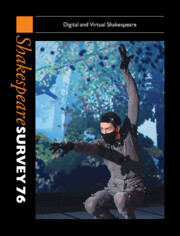Book contents
- Shakespeare Survey 76
- Shakespeare Survey
- Shakespeare Survey
- Copyright page
- Editor’s Note
- Contributors
- Contents
- Illustrations
- All Early Modern Drama Is Virtual to Us
- RSC Live from Stratford-upon-Avon: Ten Things I Think I Know, or, Of Course We’re Making a Movie
- Digital Ariel: An Interview with Mark Quartley
- Staging Digital Co-Presence: Punchdrunk’s Hybrid Sleep No More (2012) And Pandemic-Informed Pedagogies
- ‘Very Tragical Mirth’: Performing A Midsummer Night’s Dream on Screen(s) during Lockdown
- ‘Uneasy Lies the Head’: Michael Almereyda’s Halloween Cymbeline
- When Is King Lear Not King Lear?
- Sim-Ulating Shakespeare: From Stage to Computer Screen
- Metre in the Middle Distance
- ‘What’s in a “Quire”?’ Vicissitudes of the Virtual in Shakespeare’s Julius Caesar and Romeo and Juliet
- ‘And Which the Jew?’: Representations Of Shylock in Meiji Japan (1868–1912)
- Hamlet, Translation and the Linguistic Conditions of Thought
- The Pietas Of Dogberry
- Taylor Mac’s Gary and Queer Failure in Titus Andronicus
- ‘I Would Cure You’: Self-Help Advice on Love in Sidney and Shakespeare
- Shakespeare in Arden: Pragmatic Markers and Parallels
- Sycorax’s Hoop
- Shakespeare Performances in England, 2022
- Peter Kirwan, Productions Outside London
- Professional Shakespeare Productions in the British Isles, January–December 2021
- The Year’s Contribution to Shakespeare Studies
- Abstracts of Articles in Shakespeare Survey 76
- Index
All Early Modern Drama Is Virtual to Us
Published online by Cambridge University Press: 17 August 2023
- Shakespeare Survey 76
- Shakespeare Survey
- Shakespeare Survey
- Copyright page
- Editor’s Note
- Contributors
- Contents
- Illustrations
- All Early Modern Drama Is Virtual to Us
- RSC Live from Stratford-upon-Avon: Ten Things I Think I Know, or, Of Course We’re Making a Movie
- Digital Ariel: An Interview with Mark Quartley
- Staging Digital Co-Presence: Punchdrunk’s Hybrid Sleep No More (2012) And Pandemic-Informed Pedagogies
- ‘Very Tragical Mirth’: Performing A Midsummer Night’s Dream on Screen(s) during Lockdown
- ‘Uneasy Lies the Head’: Michael Almereyda’s Halloween Cymbeline
- When Is King Lear Not King Lear?
- Sim-Ulating Shakespeare: From Stage to Computer Screen
- Metre in the Middle Distance
- ‘What’s in a “Quire”?’ Vicissitudes of the Virtual in Shakespeare’s Julius Caesar and Romeo and Juliet
- ‘And Which the Jew?’: Representations Of Shylock in Meiji Japan (1868–1912)
- Hamlet, Translation and the Linguistic Conditions of Thought
- The Pietas Of Dogberry
- Taylor Mac’s Gary and Queer Failure in Titus Andronicus
- ‘I Would Cure You’: Self-Help Advice on Love in Sidney and Shakespeare
- Shakespeare in Arden: Pragmatic Markers and Parallels
- Sycorax’s Hoop
- Shakespeare Performances in England, 2022
- Peter Kirwan, Productions Outside London
- Professional Shakespeare Productions in the British Isles, January–December 2021
- The Year’s Contribution to Shakespeare Studies
- Abstracts of Articles in Shakespeare Survey 76
- Index
Summary
Critical interest in Shakespeare and virtual reality (VR) has grown steadily in recent years, inspired in part by the proliferation of newly available VR productions or adaptations of Shakespeare’s plays. Peter Otto has helpfully observed that ‘by tying virtual reality to specific technologies’, scholars ‘preclude attempts to compare digital virtual realities with those constructed in other eras and with other media’.1 My interest, in this article, lies in extending Otto’s more capacious understanding of virtual reality to a consideration of sensory manipulation in a metaphorical sense in relation to the constructed, controlled or otherwise limited perspectives that I argue have become ingrained in the way we, as Shakespeare scholars, apprehend the field of early modern drama.
- Type
- Chapter
- Information
- Shakespeare Survey 76Digital and Virtual Shakespeare, pp. 1 - 8Publisher: Cambridge University PressPrint publication year: 2023

